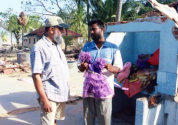

© Still Waters Trust 2021 All Rights Reserved
S T I L L W A T E R S T R U S T
Caring for Vulnerable Children in Sri Lanka
Tsunami 2004 Disaster
The disaster struck on Boxing Day 2004
Still Waters raised significant funds to help families rebuild their homes and restore their livelihood. We provided fishing boats, nets and outboard motors to help fishermen get back to work. We built new homes. We donated computers, books and equipment to help schools with their training programmes. Still Waters became engaged in providing aid from the first day after the disaster on Boxing Day, Sunday, 26th December 2004. We used all the reserve funds we had to help with the immediate needs of the survivors. From the first days, it was evident that rebuilding and reconstruction work would be a long-term project and Still Waters was, and is, committed to support survivors in this task.Homes and property completely destroyed
It is difficult to describe the extent of the damage to home and property. The pictures
show a little of the devastation caused by the Tsunami.
During my time in Sri Lanka I visited Batticaloa on the Eastern coast which took the worst
of the hit from the Tsunami. The sight that awaited us as we entered the coastal areas is
hard to describe.
Street after street all along the coast was a scene of complete devastation. It was hard to
find a house that was still standing. The waves had gone deep inland and turned
thousands of homes to rubble. Every plot where once there was a proud home of a family
had been raised to the ground and remains still just as the Tsunami had left it after doing
its destructive work. Amid the shattered ruins were personal clothing, the odd cooking
utensil, letters and papers, a photo album and what remains of many peoples’ homes.
And there were white flags everywhere, row after row of them, a piece of white cloth
fastened to a piece of stick to indicate the death of a person. Some plots had several
flags telling the sad and painful truth of entire families who had perished.
On many a plot I met a lone individual or a couple standing or sitting in silence and
staring at the sea. Their eyes glazed with a deep sorrow giving glimpses of a sad and
broken heart. It was not a time for talk. I stood in silence with them as a sign of solidarity
and whispered a prayer for healing of pain, easing of sorrow and the dawn of hope for
these unfortunate fellow human beings.
One story from the many ….
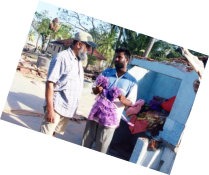
Still Waters visit shortly
after the disaster
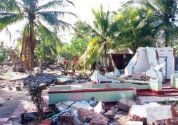
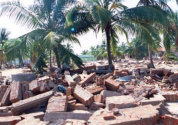
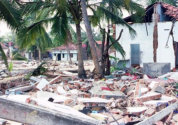
Boats grounded and swept
ashore
Trees uprooted
Buildings and schools
destroyed
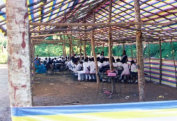
Temporary classrooms set
up
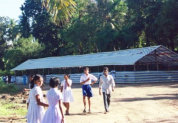
Providing school packs for
each child
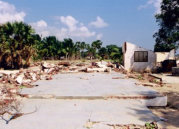
Help with re-housing poorer
families



One of the people I was able to talk to was Lakshman (Lucky), who told me his story
struggling to hold back the tears.
He and his family were all ready to go to church on Sunday 26th December. They were a few
minutes late because his 21 month old daughter was not ready, and the Tsunami hit their
home.
The first wave entered the house with up to six feet of water, and he gathered his wife, child
and the rest of the family and tried to escape when the second wave over thirty feet high
engulfed his home and swept everyone and everything away.
When the waters subsided, Lucky was found alive over 1,000 meters away, but in a serious condition having swallowed
too much sea water. He was rushed to hospital where he remained for over ten days. His wife (27), his daughter
(21 months), his mother (53) and his sisters (13 and 18) were all dead. All but the body of his only baby daughter were
recovered.
Lucky also lost his home, his two fishing boats, his minibus and his engineering workshop. He was clutching the dried out
copy of his New Testament as he recalled that fateful Sunday, and wished he had left for church five minutes earlier.
We gathered around Lucky embraced him and prayed for him standing amid the ruins of what had been a home he had
worked so hard to build.
Lucky needed to get back to purposeful employment and needed carpentry and engineering tools, and we were able to
get him a starter pack of tools the next day.
I hope Lucky will get the emotional and spiritual support he needs to overcome the trauma of the Tsunami and begin to
rebuild his life.
V Frederick George MBE Director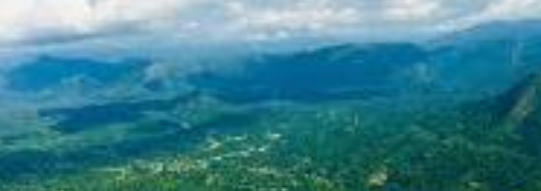
Tsunami 2004 Disaster
The disaster struck on Boxing Day 2004
Still Waters raised significant funds to help families rebuild their homes and restore their livelihood. We provided fishing boats, nets and outboard motors to help fishermen get back to work. We built new homes. We donated computers, books and equipment to help schools with their training programmes. Still Waters became engaged in providing aid from the first day after the disaster on Boxing Day, Sunday, 26th December 2004. We used all the reserve funds we had to help with the immediate needs of the survivors. From the first days, it was evident that rebuilding and reconstruction work would be a long-term project and Still Waters was, and is, committed to support survivors in this task.Homes and property completely destroyed
It is difficult to describe the extent of the damage to home and
property. The pictures show a little of the devastation caused
by the Tsunami.
During my time in Sri Lanka I visited Batticaloa on the Eastern
coast which took the worst of the hit from the Tsunami. The
sight that awaited us as we entered the coastal areas is hard
to describe.
Street after street all along the coast was a scene of complete
devastation. It was hard to find a house that was still
standing. The waves had gone deep inland and turned
thousands of homes to rubble. Every plot where once there
was a proud home of a family had been raised to the ground
and remains still just as the Tsunami had left it after doing its
destructive work. Amid the shattered ruins were personal
clothing, the odd cooking utensil, letters and papers, a photo
album and what remains of many peoples’ homes.
And there were white flags everywhere, row after row of them,
a piece of white cloth fastened to a piece of stick to indicate
the death of a person. Some plots had several flags telling the
sad and painful truth of entire families who had perished.
On many a plot I met a lone individual or a couple standing or
sitting in silence and staring at the sea. Their eyes glazed with
a deep sorrow giving glimpses of a sad and broken heart. It
was not a time for talk. I stood in silence with them as a sign
of solidarity and whispered a prayer for healing of pain, easing
of sorrow and the dawn of hope for these unfortunate fellow
human beings.
One story from the many ….
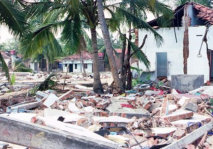
Buildings and schools
destroyed
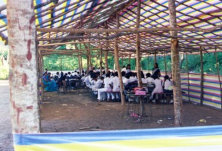
Temporary classrooms set
up

One of the people I was able to talk to was Lakshman (Lucky),
who told me his story struggling to hold back the tears.
He and his family were all ready to go to church on Sunday
26th December. They were a few minutes late because his 21
month old daughter was not ready, and the Tsunami hit their
home.
The first wave entered the house with up to six feet of water,
and he gathered his wife, child and the rest of the family and
tried to escape when the second wave over thirty feet high
engulfed his home and swept everyone and everything away.
When the waters subsided, Lucky was found alive over 1,000
meters away, but in a serious condition having swallowed too
much sea water. He was rushed to hospital where he remained
for over ten days. His wife (27), his daughter (21 months),
his mother (53) and his sisters (13 and 18) were all dead.
All but the body of his only baby daughter were recovered.
Lucky also lost his home, his two fishing boats, his minibus
and his engineering workshop. Lucky was clutching the dried
out copy of his New Testament as he recalled that fateful
Sunday, and wished he had left for church five minutes earlier.
We gathered around Lucky embraced him and prayed for him
standing amid the ruins of what had been a home he had
worked so hard to build.
Lucky needed to get back to purposeful employment and
needed carpentry and engineering tools, and we were able to
get him a starter pack of tools the next day.
I hope Lucky will get the emotional and spiritual support he
needs to overcome the trauma of
the Tsunami and begin to rebuild his life.
V Frederick George MBE Director





© Still Waters Trust 2022 All Rights Reserved
Tsunami 2004 Disaster
The disaster struck on Boxing Day 2004
Still Waters raised significant funds to help families rebuild their homes and restore their livelihood. We provided fishing boats, nets and outboard motors to help fishermen get back to work. We built new homes. We donated computers, books and equipment to help schools with their training programmes. Still Waters became engaged in providing aid from the first day after the disaster on Boxing Day, Sunday, 26th December 2004. We used all the reserve funds we had to help with the immediate needs of the survivors. From the first days, it was evident that rebuilding and reconstruction work would be a long-term project and Still Waters was, and is, committed to support survivors in this task.Homes and property completely destroyed
It is difficult to describe the extent of the damage to home and
property. The pictures show a little of the devastation caused by
the Tsunami.
During my time in Sri Lanka I visited Batticaloa on the Eastern
coast which took the worst of the hit from the Tsunami. The sight
that awaited us as we entered the coastal areas is hard to
describe.
Street after street all along the coast was a scene of complete
devastation. It was hard to find a house that was still standing.
The waves had gone deep inland and turned thousands of homes
to rubble. Every plot where once there was a proud home of a
family had been raised to the ground and remains still just as the
Tsunami had left it after doing its destructive work. Amid the
shattered ruins were personal clothing, the odd cooking utensil,
letters and papers, a photo album and what remains of many
peoples’ homes.
And there were white flags everywhere, row after row of them, a
piece of white cloth fastened to a piece of stick to indicate the
death of a person. Some plots had several flags telling the sad
and painful truth of entire families who had perished.
On many a plot I met a lone individual or a couple standing or
sitting in silence and staring at the sea. Their eyes glazed with a
deep sorrow giving glimpses of a sad and broken heart. It was not
a time for talk. I stood in silence with them as a sign of solidarity
and whispered a prayer for healing of pain, easing of sorrow and
the dawn of hope for these unfortunate fellow human beings.
One story from the many ….
Still Waters visit shortly
after the disaster



Boats grounded and swept
ashore
Trees uprooted
Buildings and schools
destroyed

Temporary classrooms set
up

Providing school packs for
each child

Help with re-housing poorer
families




